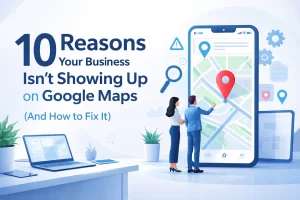As businesses continually seek innovative and efficient ways to reach their target audience and drive sales, pay-per-click (PPC) advertising has emerged as a go-to digital marketing tactic. PPC allows businesses to place well-timed, targeted ads in front of their potential customers while only paying when a user clicks on the ad. When executed correctly, PPC advertising offers tremendous benefits, including increased brand visibility, traffic generation, and lead conversion, all without breaking the bank.
We pride ourselves on being a web development and digital marketing agency focused on empowering our clients’ businesses to grow and thrive in a competitive digital landscape. Our expertise in PPC advertising enables us to help you harness its potential by building and managing effective campaigns tailored to your unique goals and budget.
To ensure a successful PPC campaign that aligns with your business objectives and boosts your ROI, partner with Kudzu Digital today and let our team of PPC experts help you navigate the path to digital marketing success.
1. Understanding PPC Platforms and Campaign Types
To build a successful PPC campaign, you must first choose the appropriate platform and campaign type. Here are some popular platforms and types of campaigns to consider:
- Google Ads: Formerly known as Google AdWords, this platform allows you to place your ads on Google search results, Google Display Network, and YouTube. Key campaign types include Search Network, Display Network, Shopping, and Video campaigns.
- Bing Ads: This platform enables you to reach users of Microsoft’s search engine, Bing. While similar to Google Ads, Bing Ads often offer a lower cost-per-click and less competition.
- Social Media Ads: Platforms such as Facebook, Instagram, Twitter, and LinkedIn offer PPC advertising options. These platforms can provide access to vast audiences and advanced targeting options.
Choose a platform and campaign type that aligns with your marketing objectives and audience preferences to maximize ad visibility and performance.
2. Conducting Effective Keyword Research
Well-targeted keywords are the foundation of PPC campaigns. Perform comprehensive keyword research to identify the terms and phrases your target audience is using when searching for products or services like yours. Implement the following tactics for effective keyword research:
- Start with brainstorming and competitor analysis: Consider your products and services and brainstorm the search terms prospective customers might use. Analyze your competitors’ PPC ads to gather keyword ideas and identify opportunities.
- Utilize keyword research tools: Use tools such as Google Ads’ Keyword Planner, Ubersuggest, and Ahrefs Keyword Explorer to discover keywords with potential high search volume, low competition, and relevance to your business.
- Focus on long-tail keywords: Long-tail keywords are phrases consisting of three or more words. They tend to be less competitive and have a lower cost-per-click but often have higher conversion rates due to their specific nature.
- Continuously refine your keyword list: Regularly evaluate and update your keywords based on their performance and emerging trends in your target audience’s search behavior.
3. Budgeting, Bidding, and Audience Targeting
Effectively managing your PPC budget, bids, and audience targeting is crucial to maximizing ROI. Here are some best practices:
- Set a realistic budget: Establish a budget that aligns with your marketing goals, available resources, and the competitiveness of your industry. Monitor campaign performance and adjust budgets as needed, focusing on high-performing keywords and ad groups.
- Choose the right bidding strategy: When setting up your campaigns, consider various bid strategies, such as manual cost-per-click (CPC) bidding, enhanced CPC, and target cost-per-acquisition (CPA). Select a strategy that best aligns with your objectives, campaign type, and budget.
- Utilize precise audience targeting: Leverage your chosen platform’s targeting options, including demographics, locations, interests, behaviors, and remarketing lists, to reach the most relevant audience for your campaigns.
4. Continuous Campaign Optimization and Performance Monitoring
PPC campaigns require ongoing optimization and performance monitoring to achieve the best possible results. Implement these best practices to optimize your campaigns:
- A/B test ad copy and design: Experiment with various ad headlines, descriptions, images, and calls to action to find the combination that resonates best with your audience. Use the data from your A/B tests to inform future ad creation and optimization.
- Improve ad quality and relevancy: Strive for high ad quality and relevancy by ensuring your keywords, ad copy, and landing pages are closely related and offer valuable content to your target audience. High ad quality can lead to higher ad rankings and lower CPC.
- Utilize ad extensions: Enhance your ads with additional information, such as location, phone number, or site links, using ad extensions. Ad extensions can improve your ad visibility and overall performance.
- Analyze campaign performance regularly: Monitor key performance indicators, including clicks, impressions, click-through rate, and conversion rate. Use this data to identify areas for improvement and refine your targeting, keywords, bids, and ad content accordingly.
Leverage PPC Advertising to Boost Business Growth
When executed properly, PPC advertising can be a highly effective way to reach your target audience, generate leads, and boost conversions. By understanding the available PPC platforms, conducting thorough keyword research, managing your budget and bids, targeting the right audience, and continuously optimizing your campaigns, you can maximize your ROI and push the boundaries of your business growth.
Partner with Kudzu Digital to unleash the full potential of digital marketing with the expert guidance and support of our dedicated team. Let us help you drive exceptional results and ensure your PPC campaigns are a resounding success.






